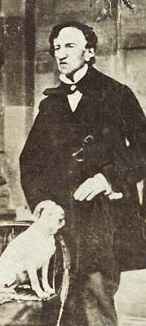
Margaret Ann Bulkley (James Barry)
c. 1789-1799 – 25 July 1865
Military Surgeon
James Miranda Stuart Barry (born Margaret Ann Bulkley), was a military surgeon in the British Army. After graduation from the University of Edinburgh Medical School, Barry served in India and Cape Town, South Africa. By the end of her career, she had risen to the rank of Inspector General in charge of military hospitals. In her travels she not only improved conditions for wounded soldiers, but also the conditions of the native inhabitants. Among her accomplishments was the first caesarean section in Africa by a British surgeon in which both the mother and child survived the operation.
Although Barry lived her adult life as a man, at birth she was a female and named Margaret Ann Bulkley, and that she chose to live as a man so that she might be accepted as a university student and able to pursue a career as a surgeon.
Evidence collected by Hercules Michael du Preez indicates that Barry was born Margaret Ann Bulkley in Ireland in 1789, the second child of Jeremiah and Mary-Ann Bulkley. Family financial mismanagement left Mary-Ann and Margaret Bulkley without the support of either Jeremiah Bulkley (in prison) or their son John (married). Letters during this time of financial hardship refer to a conspiracy between Mrs. Bulkley and some of her brother's influential, liberal-minded friends to get the teenage Margaret into medical school. A financial record from the family solicitor indicates that Mary-Ann and Margaret Bulkley travelled to Edinburgh by sea at the end of November 1809.
Following his arrival in Edinburgh, Barry began studies at the University of Edinburgh Medical School as a 'literary and medical student'. He qualified with an MD in 1812, then moved back to London. On 2 July 1813, Barry successfully took the examination for the Royal College of Surgeons of England, subsequently qualifying as a Regimental Assistant.
Barry was commissioned as a Hospital Assistant with the British Army on 6 July 1813, taking up posts in Chelsea and then the Royal Military Hospital in Plymouth, where he was promoted to Assistant Staff Surgeon. He might have served in the Battle of Waterloo (18 June 1815). After that he served in India and then in South Africa. He arrived in Cape Town between 1815 and 1817.
In a couple of weeks he became the Medical Inspector for the colony. During his stay, he arranged for a better water system for Cape Town and performed one of the first known successful Caesarean sections - the boy was christened James Barry Munnik. He also gained enemies by criticizing local handling of medical matters. He left Cape Town in 1828.
Barry's next postings included Mauritius in 1828, Trinidad and Tobago, and the island of Saint Helena. In Saint Helena he got into trouble for leaving for England unannounced. Later he served in Malta, Corfu, the Crimea, Jamaica, and in 1831 Canada.
By this time he had reached the rank of Inspector General, H.M. Army Hospitals. However, during his next posting in Saint Helena, he got into trouble with the internal politics of the island, was arrested and sent home, and demoted to Staff Surgeon. His next posting was the West Indies in 1838.
In the West Indies Barry concentrated on medicine, management and improving the conditions of the troops. He was promoted to Principal Medical Officer. In 1845, Barry contracted yellow fever and left for England for sick leave in October.
Barry was posted to Malta on 2 November 1846. Within a month of his arrival he took a seat in the local church that was reserved for the clergy and was severely reprimanded. During his stay he had to deal with a threat of a cholera epidemic, which eventually broke out in 1850. He left Malta for Corfu in 1851 with the rank of Deputy Inspector-General of Hospitals. He left Corfu in 1857 for Canada as an Inspector-General of Hospitals. In that position, he fought for better food, sanitation and proper medical care for prisoners and lepers, as well as soldiers and their families.
James Barry retired in 1864 — reputedly against his wishes — and returned to England. He died from dysentery on 25 July 1865.
To make your own nomination download the nomination form here